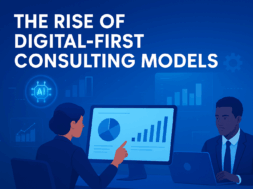The Rise of Digital-First Consulting Models

Introduction to Digital-First Consulting
The consulting industry is experiencing a fundamental transformation. Traditional face-to-face advisory services are being replaced—or at least complemented—by digital-first consulting models. With entrepreneurs increasingly embracing digital transformation, consulting is no longer confined to boardrooms. Instead, it thrives in virtual spaces, powered by AI tools, cloud platforms, and real-time knowledge systems.
Why the Shift Is Happening
The rise of digital-first consulting is fueled by the growing need for speed, scalability, and global reach. Entrepreneurs want instant insights, remote access to expertise, and data-driven recommendations. The COVID-19 pandemic further accelerated this shift, pushing even traditional consulting firms toward digital models.
AI-Powered Consulting Tools
Predictive Analytics and Strategic Planning
Artificial Intelligence (AI) is a game-changer in entrepreneurship consulting. With predictive analytics, consultants can forecast market trends, customer behavior, and business risks. AI-powered strategic planning tools help startups make informed decisions faster than ever before.
Case Studies of AI in Action
Platforms like McKinsey Digital and Deloitte Digital are already using AI to enhance consulting services. For startups, AI-driven SaaS platforms provide insights into financial health, customer engagement, and operational efficiency—at a fraction of traditional costs.
Virtual Advisory Platforms
Remote Consulting Benefits
Virtual advisory platforms make consulting more accessible and affordable. Tools like Clarity.fm, Upwork, and Fiverr connect entrepreneurs with industry experts from around the globe, breaking geographical barriers.
Democratizing Access to Expertise
Entrepreneurs in emerging markets now have the opportunity to connect with top-tier advisors without leaving their offices. Platforms like Zoom, Microsoft Teams, and Slack facilitate seamless communication, allowing businesses to tap into global knowledge networks.
Automated Knowledge-Sharing Systems
Real-Time Insights for Scaling Startups
Knowledge management systems are becoming central to consulting. These automated solutions collect, analyze, and distribute real-time insights, enabling startups to scale with confidence.
Examples of Data-Driven Systems
Predictive analytics engines and SaaS platforms provide instant recommendations on pricing, market entry, and operational adjustments—ensuring businesses can adapt quickly to changing markets.
Advantages of Digital-First Consulting Models
Cost-Effectiveness and Scalability
Entrepreneurs no longer need to invest heavily in traditional consulting retainers. Digital-first models allow flexible pricing, making consulting accessible to small and medium enterprises.
Global Reach and Expertise
With digital tools, a startup in Africa can now hire an expert from Silicon Valley or Singapore instantly. This global pool of expertise strengthens entrepreneurship ecosystems worldwide.
Speed and Agility
Digital-first consulting enables rapid strategy execution. Instead of waiting weeks for in-person reports, entrepreneurs can get real-time insights through dashboards and virtual advisory systems.
Challenges and Risks
Data Privacy and Cybersecurity
As businesses rely on digital platforms, data privacy and cybersecurity become major concerns. Entrepreneurs must ensure compliance with regulations and protect sensitive business information.
Over-Reliance on Automation
While automation boosts efficiency, it cannot replace the human element of consulting—such as emotional intelligence, mentorship, and creative problem-solving.
The Human-Centered Approach
A hybrid model that blends digital efficiency with human advisory will likely become the future standard in consulting.
You can also on: https://baobabentrepreneur.com/entrepreneurship-success-story-jennies-honey-and-foods-in-ghana/
The Future of Digital Consulting
Emerging Technologies
The next wave of consulting will integrate blockchain for transparency, Web3 for decentralized advisory models, and VR/AR for immersive consulting experiences.
Predictions for the Next Decade
By 2035, digital-first consulting may become the default model, with hybrid solutions bridging human expertise and digital intelligence. The consulting industry will evolve into an always-on, data-driven, global advisory ecosystem.
Practical Applications of Digital-First Consulting
Startups Leveraging AI for Growth
Small businesses and startups in Africa, Asia, and Latin America are increasingly using AI-powered consulting tools to refine business strategies. For instance, predictive analytics engines can identify untapped markets for agricultural products, while automated financial models help entrepreneurs manage cash flow with accuracy.
Corporates Adopting Hybrid Models
Global giants like Accenture Interactive and BCG Digital Ventures blend traditional human expertise with digital-first solutions. These hybrid models prove especially useful for large organizations that require both strategic innovation and scalable execution.
Case Study: Digital Platforms Empowering Entrepreneurs
Take the example of Clarity.fm, where early-stage entrepreneurs can book calls with leading experts for as little as $1 per minute. This direct access to industry veterans is democratizing knowledge once reserved for elite clients of traditional consultancies. Similarly, platforms like Etsy and Shopify now integrate AI-backed advisory features that recommend pricing, marketing strategies, and product placement.
Why Digital-First Consulting Matters for Emerging Markets
Closing the Access Gap
Entrepreneurs in regions like Sub-Saharan Africa and Southeast Asia often lack affordable access to top-tier consultants. Digital-first consulting models help bridge this gap by offering remote expertise, automated insights, and virtual mentorship programs.
Boosting Entrepreneurship Ecosystems
As more startups and SMEs adopt digital-first consulting, they fuel local innovation, create jobs, and attract global investment. This ripple effect strengthens national economies and enhances competitiveness in the global marketplace.
How Entrepreneurs Can Adopt Digital-First Consulting
- Start with Free or Low-Cost Platforms
Explore platforms like Upwork or Fiverr to connect with consultants who can provide targeted advice at manageable rates. - Leverage AI Tools
Tools such as HubSpot, Tableau, and Zoho Analytics offer automated insights that replace the need for costly reports. - Integrate Virtual Communication Channels
Platforms like Zoom and Microsoft Teams enable continuous advisory without the limitations of geography. - Prioritize Security
Invest in strong cybersecurity solutions to protect sensitive business data shared online.
Final Thoughts: A New Era of Consulting
The shift to digital-first consulting models is more than just a trend—it represents a fundamental evolution in how businesses grow and thrive. Entrepreneurs who embrace these models will enjoy faster insights, global access, and cost-effective solutions, giving them a competitive edge.
At the same time, the consulting profession itself is being redefined. Advisors who combine digital intelligence with human empathy will shape the next generation of entrepreneurial success stories.
In the future, consulting won’t just be about advice—it will be about real-time collaboration, predictive foresight, and a global ecosystem of shared knowledge. Entrepreneurs who adapt early will be the pioneers of this digital-first revolution.
Conclusion
The rise of digital-first consulting models marks a turning point in how entrepreneurs access guidance and expertise. With the help of AI, virtual platforms, and automated systems, consulting is now more scalable, affordable, and globally accessible. While challenges remain, the future promises a hybrid ecosystem where human advisors and digital tools work hand-in-hand to shape the next era of entrepreneurship.

















